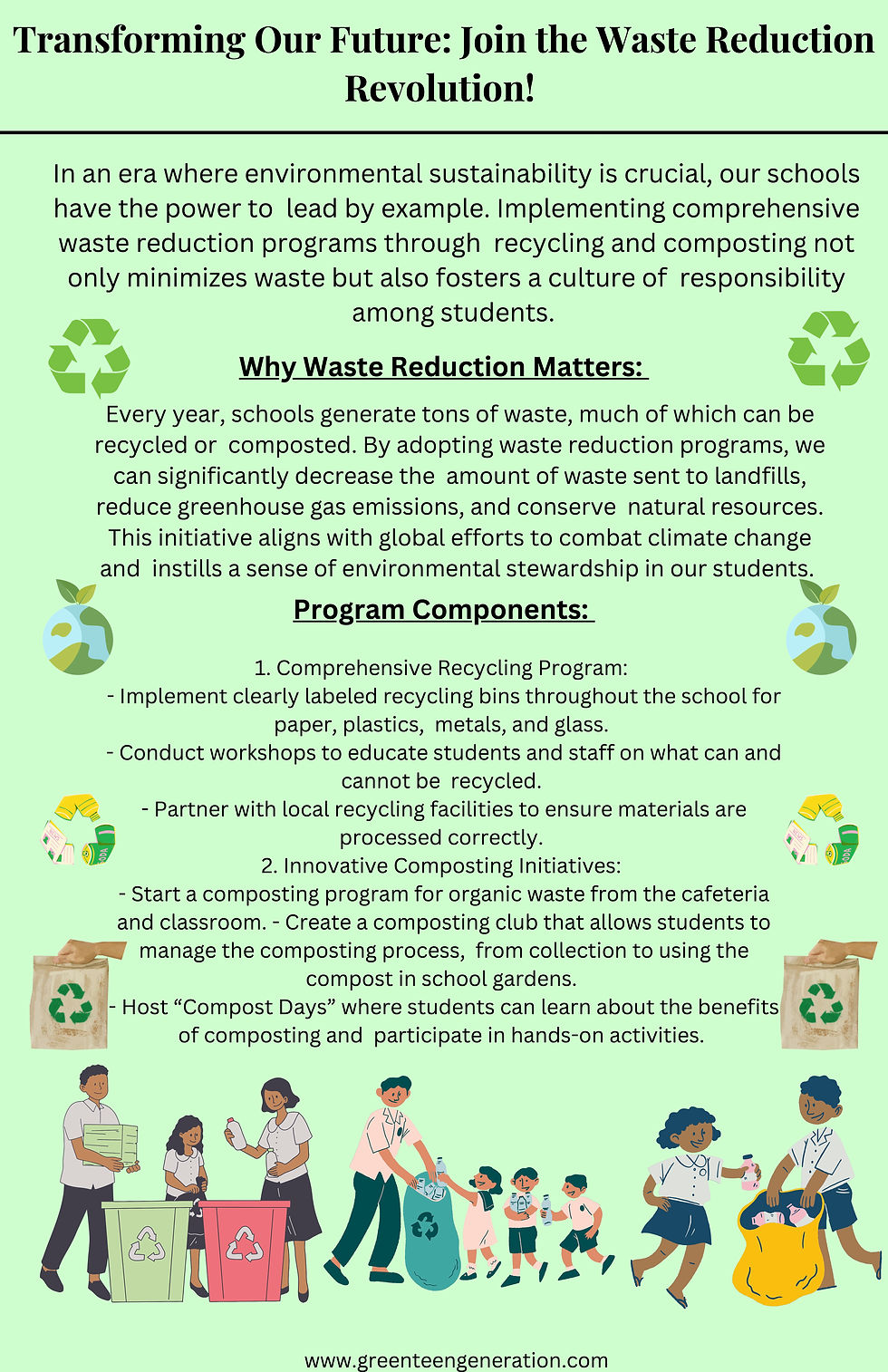50 Ways to Reduce Plastic Right Now
- Nov 2, 2023
- 3 min read

Plastic is an integral part of our daily lives, from grocery bags to food storage containers and everyday items like toothbrushes and children's toys. While it may seem harmless, the consequences of plastic use extend far beyond convenience. Plastic waste poses a severe threat to the environment and can have adverse effects on human health. In this blog post, we'll explore 50 ways to reduce plastic usage, highlighting the importance of minimizing our plastic footprint.
Why We Need to Reduce Plastic:
Plastic Waste Pollution: Plastic takes up to 1,000 years to decompose, leading to long-lasting pollution. The consequences of this include littered streets, clogged drains, and massive plastic waste patches in the oceans. Reducing plastic use is essential to combat water pollution.
Plastic Adversely Affects Human Health: Microplastics, tiny plastic components less than five millimeters in length, can be ingested by humans through various sources. Research suggests that microplastics can cause health issues such as oxidative stress and cytotoxicity.
Plastic Kills Wildlife: Wildlife often ingests or gets entangled in plastic waste, leading to dire consequences. More than 90% of sea birds have plastic in their stomachs, and land animals also suffer due to plastic pollution.
Beware: Not All Plastic Is Bad: While plastic has negative impacts, it serves crucial purposes, such as in medical equipment and food packaging to reduce food waste. The issue lies in human misuse and improper disposal of plastic waste.
50 Ways to Reduce Plastic:
Don't use chewing gum.
Avoid single-use carrier bags.
Use reusable straws and eco-friendly kitchenware.
Buy products in glass containers instead of plastic bottles.
Choose cardboard over plastic boxes.
Carry a reusable bottle or cup when going out.
Bring your own food containers when eating out.
Be mindful of plastic packaging when buying frozen foods.
Opt for cloth diapers instead of plastic ones.
Use reusable period pads, underwear, or explore options like Trade to Aid reusable sanitary pads.
Join the no-poo (no shampoo) movement.
Squeeze your own juice rather than buying plastic-bottled juice.
Make your own cleaning products or use natural stain removers.
Buy fruits and vegetables from local farmers' markets or opt for loose produce at the supermarket.
Use a safety razor instead of disposable ones.
Shop locally instead of ordering online.
Grow your own herbs.
Use reusable or biodegradable bin bags, especially for the food bin.
Purchase condiments in glass jars rather than plastic bottles.
Wash dishes with cotton cloths and eco-friendly dish soap.
Use vegan wax wraps instead of clingfilm.
Avoid single-use coffee pods and opt for traditional coffee brewing methods.
Choose natural, non-synthetic clothing.
Use shampoo and soap bars, such as Viori shampoo bars.
Consider using solid deodorant bars.
Properly recycle broken electronic gadgets.
Sell or donate plastic products you no longer need instead of discarding them.
Prefer wooden toys over plastic for children.
Minimize pen use by typing on a computer.
Freshen the air by opening windows or burning candles.
Enjoy ice cream in a cone instead of a plastic cup.
Avoid single-use plastic gloves and opt for natural rubber gloves or bare hands.
Use reusable toilet paper or choose toilet rolls without plastic packaging.
Opt for a wooden hairbrush over a plastic one.
Learn to recycle correctly or use plastic-free products.
Educate family and friends about plastic's negative impact to inspire change.
Choose tinned soup over plastic-bagged options.
Purchase meat from local butchers or explore vegetarian options.
Bulk buy whenever possible.
Replace disposable tissues with a handkerchief.
Buy pet food in tins rather than pouches.
Reuse existing plastic products as much as possible.
Remember to fill your water bottle to avoid purchasing plastic bottles when on the go.
Refrain from buying travel-sized toiletries; opt for regular-sized bottles and reusable travel containers.
Challenge yourself to go zero-waste shopping, starting with a zero-waste starter kit.
Use loose tea instead of tea bags and support Fairtrade tea brands.
Choose a charcoal water filter instead of one with plastic filters.
Utilize wooden chopping boards.
Select kitchen knives with wooden handles.
Use matches to light fires instead of plastic lighters.
You Can Do Better Than This: While this list is extensive, it's not exhaustive. There are countless ways to reduce your plastic consumption, so stay vigilant and open to new opportunities. Remember, perfection isn't necessary. Taking action and striving for a plastic-reduced lifestyle is a significant step forward.
Summary: Plastic poses significant threats to the environment and human health. Reducing plastic use is imperative, and these 50 ways to reduce plastic provide a starting point. However, the list is not all-encompassing, and you should always seek new ways to minimize your plastic footprint. By making conscious choices and spreading awareness, we can collectively create a more sustainable and plastic-free world.




Comments